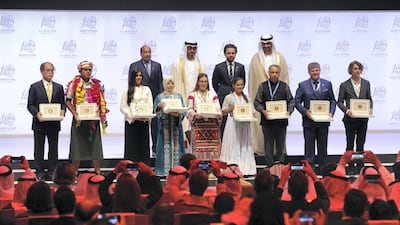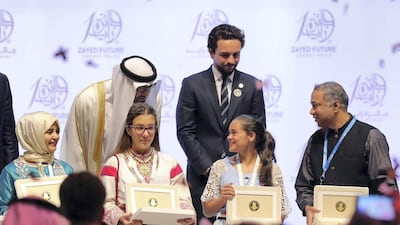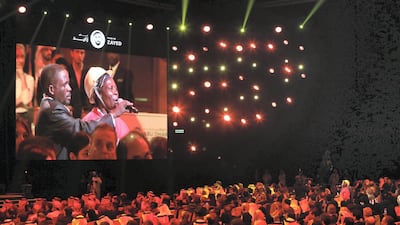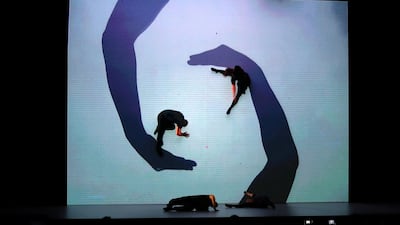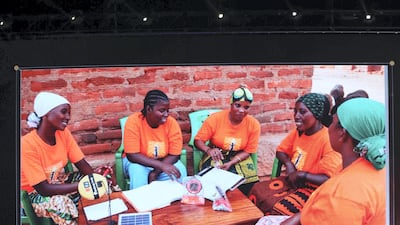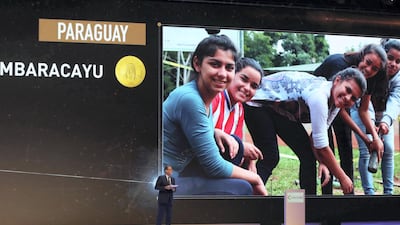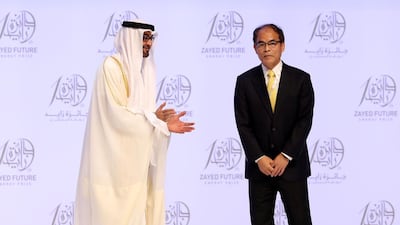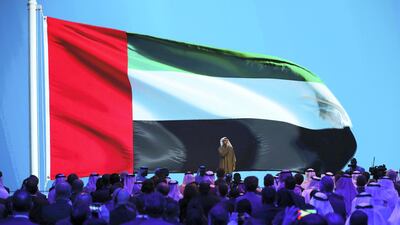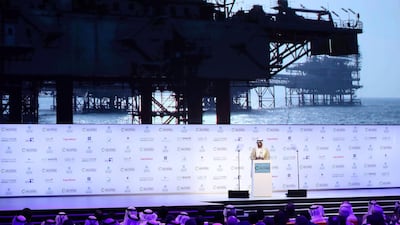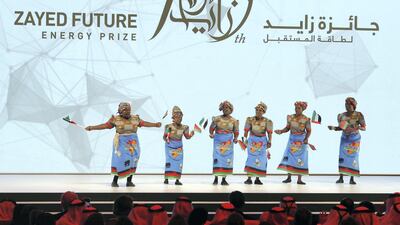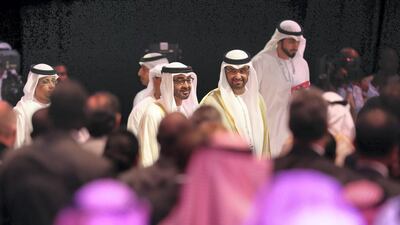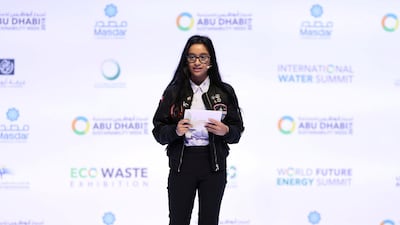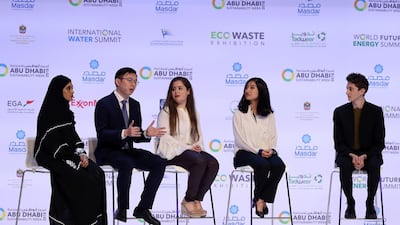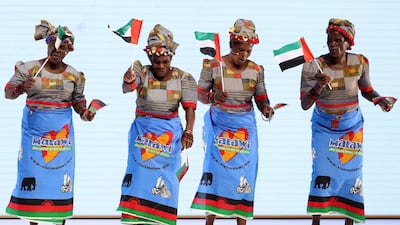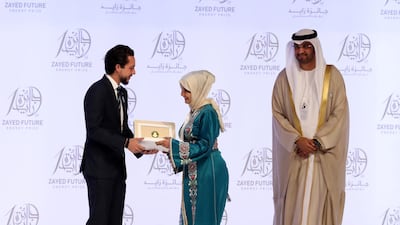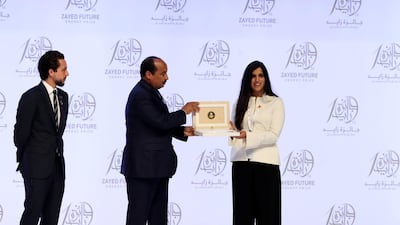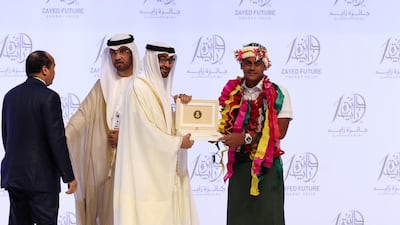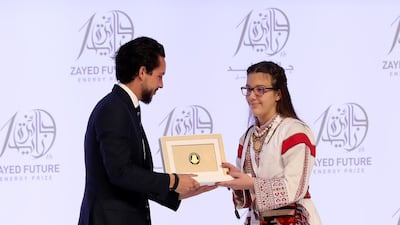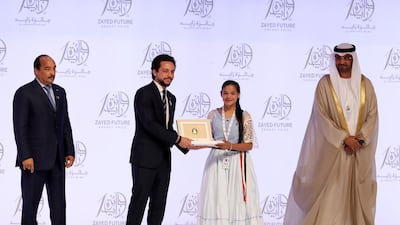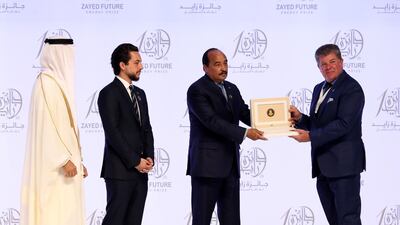As the country comes together to commemorate the UAE Founding Father this year, Sheikh Zayed’s environmental legacy lives on in an award that supports the brightest and most ambitious minds in sustainability efforts.
In its tenth year, the Zayed Future Energy Prize awarded millions of dollars to nine individuals, schools, companies and organisations on the sidelines of Abu Dhabi Sustainability Week on Monday.
“[Sheikh Zayed’s] environmental stewardship continues to shape the development of our nation, guiding it to greater heights while inspiring sustainability initiatives globally,” said Sheikh Mohammed bin Zayed, Crown Prince of Abu Dhabi and Deputy Supreme Commander of the Armed Forces, who presented the awards with Dr Sultan Al Jaber, Minister of State and group chief executive of Abu Dhabi National Oil Corporation.
“It truly is heartening to witness the Prize’s far-reaching impact across the world in the last decade, improving energy access, quality of life and the environment through innovations in clean technology,” he said.
Among those innovators is Shuji Nakamura, a Japanese inventor and Nobel Prize winner, who was presented with the US$500,000 (Dh1.84 million) Lifetime Achievement Award.
_____________
Read more:
Meet the 2018 Zayed Future Energy Prize winners
_____________
Mr Nakamura, who is a professor of materials in electrical and computer engineering at University of California in Santa Barbara is widely regarded as the inventor of the energy-saving blue LED.
“I didn’t expect to win at all,” said Mr Nakamura.
The 63-year-old inventor has always been at the forefront of innovation, even convincing his boss at a small company in Japan in the 1980s to pursue development of a blue or green LED.
"He told me I was crazy, that his company was tiny and it had no budget or people."
Development of LEDs is expensive and companies like Sony, Panasonic and Toshiba were spending 100 million dollars at the time to develop the LEDs.
"My company's revenue was 20 million dollars at the time. I was desperate so I asked my chairman, he agreed and funded it with five million dollars."
It took him four years to develop. "I'm very happy because LED is everywhere now," he said. "It reduces electricity consumption dramatically. In comparison to conventional light bulbs, it's only a tenth in consumption of electricity and half when compared to fluorescent lamps."
The winners of the eight other awards, worth a total of Dh14.7m, were announced on Monday, with thousands of policymakers, experts and heads of state in attendance.
During his opening speech, Dr Al Jaber said the future of sustainable development was in the hands of the youth.
“Today, we turn to this next generation — it is their energy, imagination and drive that will ensure we remain on track towards sustainability in a fast-evolving world,” he said.
This year’s Abu Dhabi Sustainability Week is intentionally focused on Generation Next.
“No one is more suited, more willing and more able to stay ahead of the curve than our positive young people.
“As we celebrate the Year of Zayed, it is their turn to take Abu Dhabi Sustainability Week to the next level, to carry forward the legacy of our Founding Father Sheikh Zayed and to fulfil his vision of a world that will endure for countless generations, underpinned by peace, progress and prosperity.”
Other winners included Google which won the Large Corporation Award for their efforts to reuse materials in what its vice president of data centres described as “circular economy”.
“The servers in this last year were 36 per cent re-manufactured.
“We believe in a more circular economy where we can put those resources back into the economy and remanufacture our servers,” said Joseph Kava.
___________
Read more:
Special report: How the Zayed Future Energy Prize helped to light up the lives of children in Malawi
Record number of entries for Zayed Future Energy Prize
___________
The $1.5m prize for small and medium enterprises was awarded to Sunna Design and the $1.5m non-profit organisation award was won by Selco Foundation.
In the Global High Schools category, five institutions from five different regions received $100,000 each to further their efforts in teaching pupils about the importance of sustainability.
Centro Educativo Mbaracayu in Paraguay won the award from the Americas category.
In Europe, Vladimir Nazor School, was won the prize after applying for the first time in a bid to win funding to install a solar system to provide both electricity and water heating at the school. The 145-year-old school was destroyed and burnt during the Homeland War.
From the Africa category, Aouda Saadia High School was awarded the Dh367,300 prize for its plans to use solar water heaters, photovoltaic panels and LED light bulbs to reduce the school’s energy expenditure and provide hot showers. The school also used technology to install floor lamps so students attending night classes were safe and literacy classes can be held for some women in the community.
Motufoua Secondary School from the small Polynesian island nation of Tuvalu won from the Oceania category on Monday.
Kalita Homasi, one of the school’s 300 pupils said power cuts are an issue for them.
"Sometimes the lights go off and the only form of transportation is by ship because we're an outer island, so sometimes we need gas but the ship is delayed so this [prize] will help us," the 17-year-old pupil said.
The money will go towards a biogas project to increase the capacity of the school's solar system.
The Bahrain Bayan School — the winning school from Asia — intends use their prize money to develop a learning platform that will be used to educate pupils and the community on sustainable practices and technologies. The school also runs the country’s first sustainable cafeteria.
“We try to incorporate things like vertical farming in our school and a solar panel to power the cafeteria,” said Aya Al Khalifa, a 17-year-old pupil of the school.
“With the prize money, we will be able to have it run on biodiesel and biogas. We also have a greywater recycling system and LED lights, we’re just trying to do everything we can to make a difference,” she said.
The Zayed Future Energy Prize was launched in 2008 by Sheikh Mohammed bin Zayed at the World Future Energy Summit in honour of UAE Founding Father Sheikh Zayed's legacy of environmental stewardship.
Since the prize's establishment 10 years ago, more than 307 million people have been positively affected by the winners of the award and 157 million have access to renewable energy. The school aims to become a holistic model, both self-sufficient and sustainable.
